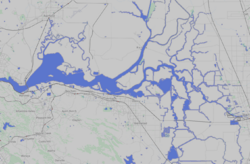Browns Island (San Joaquin County) facts for kids
| Geography | |
|---|---|
| Location | Northern California |
| Coordinates | 37°57′37″N 121°21′21″W / 37.96028°N 121.35583°W |
| Adjacent bodies of water | Sacramento–San Joaquin River Delta |
| Highest elevation | 13 ft (4 m) |
| Administration | |
|
United States
|
|
| State | |
| County | San Joaquin |
Browns Island is a small piece of land located in the Sacramento–San Joaquin River Delta. This island is part of San Joaquin County, which is in California. Its exact spot on a map is at 37°57′37″N 121°21′21″W / 37.96028°N 121.35583°W. In 1995, the United States Geological Survey measured Browns Island as being about 13 ft (4.0 m) above sea level.
Contents
What is Browns Island?
Browns Island is a tiny island within the large network of waterways known as the Sacramento-San Joaquin River Delta. It is one of many islands that make up this unique natural area. These islands are often formed by the rivers depositing soil and sediment over time.
Where is Browns Island Located?
Browns Island is found in the northern part of California. It sits within the vast delta region where the Sacramento and San Joaquin Rivers meet. This area is a mix of rivers, sloughs (small channels), and islands. The island is officially part of San Joaquin County.
How Big is Browns Island?
While specific size details for Browns Island are not widely published, it is known as a "small island." Its elevation is quite low, only about 13 feet (4 meters) above sea level. This low elevation is typical for many islands in the Delta, which are often close to the water level.
Exploring the Sacramento-San Joaquin River Delta
The Sacramento-San Joaquin River Delta is a very important natural area in California. It's where two of California's biggest rivers, the Sacramento and San Joaquin, come together. They then flow into San Francisco Bay. This delta is like a giant wetland, full of channels, sloughs, and many islands.
Why is the Delta Important?
The Delta plays a huge role in California. It provides drinking water for millions of people. It also supplies water for farming, which helps grow much of the food we eat. Beyond that, it's a vital habitat for many kinds of plants and animals.
Life in the Delta's Waterways
The Delta's waters are home to many fish species. Some of these fish are unique to this area. The channels and sloughs are like highways for boats and ships. They also create a complex ecosystem for aquatic life.
Wildlife and Nature on Delta Islands
Islands like Browns Island are crucial for the wildlife in the Delta. Even small islands can provide safe places for animals. They offer shelter and food away from human activity.
Who Lives on Delta Islands?
Many different animals call the Delta home. Birds, like ducks, geese, and herons, use the islands for nesting and resting. Mammals such as river otters and beavers can also be found. Various insects and amphibians thrive in the wetland environment.
Plants of the Delta
The plants on these islands are adapted to wet conditions. You might find tall grasses, reeds, and willow trees. These plants help stabilize the soil and provide food and cover for animals. They are an important part of the Delta's natural beauty.
Why are Islands Like Browns Island Important?
Small islands in the Delta, including Browns Island, serve several important purposes. They are more than just pieces of land. They are key parts of a larger, complex ecosystem.
Protecting the Environment
These islands act as natural filters for water. They help to clean the water as it flows through the Delta. They also help to control floods by absorbing excess water during heavy rains. This protects nearby communities.
Habitats for Animals
Perhaps most importantly, islands like Browns Island provide critical habitats. They are safe havens for many species of plants and animals. Some of these species are rare or endangered. Protecting these islands helps protect the biodiversity of California.
Future of Delta Islands
Many efforts are underway to protect and restore the Delta's islands. Scientists study these areas to understand how they work. Conservation groups work to preserve their natural state. This ensures they remain healthy for future generations.
Images for kids




